Blackberry owners try to minimize buzz

While the Rev. Bill Wiseman was delivering a sermon at his church in Owasso, Okla., a few weeks ago, he heard a buzz coming through the speaker system.
Slyly, careful not to lose his train of thought, he felt his way through six layers of Episcopalian vestments to the bottom of his pants pocket so he could silence the culprit: his Treo wireless email device. He had forgotten to turn it off.
“You’ve got all these words you’ve practiced, and the timing is just right, and all of a sudden this wah-wah comes out the loudspeaker and you know it’s you,” says Wiseman. “It looks like you’re trying to scratch yourself during the sermon and that’s not very appealing.”
Hand-held email devices are well known to cause woes ranging from wounded thumb tendons to strained marriages. Add to all that the aggravating hum emanating from stereos, alarm clocks and public-address systems when the devices are in close proximity to them.
The noise is known in some circles as “BlackBerry buzz.” The mosquito-like noise happens when the electrical circuitry of a phone or other electronic device converts cell phone radio waves into audio waves. This happens specifically with a type of wireless technology that transmits data in a series of pulses that cause the buzzing sound.
The noise occurs more often with smart phones like BlackBerrys than it does with regular cell phones because smart phones talk to cellular base stations more often in sending and receiving emails as well as calls.
A community of fed-up users of BlackBerrys, Treos and other wireless email hand-held devices is emerging, rallying against the buzz that interrupts business meetings, conference calls, courtroom proceedings, congressional hearings and sleep. In the hopes of avoiding interference with speakerphones or amplification systems, some hold their devices under the table at meetings and conferences. Others move them away from alarm clocks and baby monitors to block the buzz. Some have bought thicker cases for their devices or improvised aluminum-foil shielding. One user described removing the back cover of the device, spraying it with lacquer and sprinkling on a layer of metal shavings.
In public settings, the buzz culprits are often ashamed and try to surreptitiously silence the offending noise. While attending a panel discussion with the cast of the TV show “Everybody Hates Chris” in Los Angeles recently, Grant Cohen couldn’t resist pulling out his BlackBerry email device for a peek at incoming mail. But Cohen, who is 25 years old and works for a technology start-up, unfortunately was sitting next to a gigantic speaker and sent the buzzing across the entire audio system, causing hundreds of people in the audience to cringe.
“I immediately thought: shoot!” says Cohen, who shoved the device back in his pocket so as not to give his indiscretion away. “I was terribly embarrassed.”
Wiseman, who doubles as a political consultant and is known for writing the first lethal-injection legislation as a state lawmaker, has found his own solution: He switches off his device when the buzz infiltrates his iPod speakers during marriage-counseling sessions.
Some people in search of a technical solution to the buzz have turned to chat groups online to seek advice and trade tips. “Are there any kind of shielded cases/gloves out there? Can I wrap it in tinfoil? Anything?” one user with the screen name “aklaum” asked on a consumer Web site called blackberryforums.com.
One response was from Mark Kimmey, who says the noise got so bad on his telephone headset that he wrapped a piece of aluminum foil around his device, which sits on his office desk. For the most part, it worked. But he hasn’t bothered to duplicate the system at home and still sometimes gets a hum.
“I’ve learned not to place it too close to my speakers on my desk at home,” says Kimmey, a software consultant in New York at the consulting firm Parsons Brinckerhoff Inc.